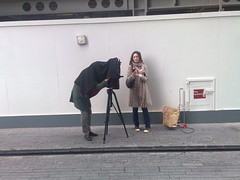 So part II of my academic week wasn’t even planned at the beginning of the week. After my panel contribution at Wealth Of Networks II, I was having a conversation with Marina Jirotka of Oxford Univerisity, who said they had another conference on Thursday entitled ‘Innovative Media For the Digital Economy‘ and wished she’d known about me earlier so I could’ve been involved… so I did what any conference loving solo bassist would do – moved my teaching around, and cleared space in my diary to be there!
So part II of my academic week wasn’t even planned at the beginning of the week. After my panel contribution at Wealth Of Networks II, I was having a conversation with Marina Jirotka of Oxford Univerisity, who said they had another conference on Thursday entitled ‘Innovative Media For the Digital Economy‘ and wished she’d known about me earlier so I could’ve been involved… so I did what any conference loving solo bassist would do – moved my teaching around, and cleared space in my diary to be there!
This one was a very different format – after a really fascinating keynote address in the morning by Charlie Leadbeater (full of fantastic brain food that will no doubt trickle into the blog over the coming months…), what followed were a series of 7 minute talks about the various projects that the research cluster hosting the event had funded and resourced. The number of areas the research covered was impressive – news, transport, medicine, fashion, festivals… (full list with links here) …all looking at ways that online communication, interaction and media could enhance and improve communications, interactivity and functionality.
So what was my role? Well apart from asking lots of questions about all the things that got my brain whirring as the day progressed (pretty much everything was fascinating in some way or other) I was also on a panel at the end, talking about the day, how it went and where it could go.
And what was most fun about that role is that as a non-academic (at least in terms of my current occupation), I was able to talk about the way that ‘research’ in the online world needs to evolve. As I said in the post about ‘Wealth Of Networks‘, technology no longer provides useful limits for research, any more than oxygen limits experimentation with life. Research in the future of the internet HAS to be done by practitioners, in conjunction with those who are already innovating in these areas out of necessity. This is not a future that’s going to be defined by academia then handed to the masses. So many of the innovations we now have online were developed out the curiosity of users who just wondered if they could meet their own needs and wants… But there are also possibilities for online innovation that raise huge ethical, moral and ontological questions that require the input of people who understand that the internet doesn’t change the nature of humanity, but it does facilitate previously latent qualities to be expressed, good and bad. Which is where the input, wisdom and influence of social scientists, artists and philosophers is vital in framing the nature of developmental research.
Interestingly, the Internet Centre at Imperial has a team of developers on hand who work with the professors and research students to make the projects happen – there are different roles at work here, and the future is in the symbiosis, where needs and wants are put forward by users, understood by social scientists and solved by programmers, all the while be watched, mapped and documented by researchers.
After the unpleasant notion of an EU-sponsored web-take-over from the wealth of networks, it was great to be in a room full of academics who were hands-on with the web, not dispassionately observing life online. But there need to be more ‘power users’ involved helping to refine the areas chosen for research.
Obligatory Tuttle Reference:
Which is where groups like Tuttle can come in. The Tuttle club, as I mentioned many times before, is the gathering of social media practitioners and innovators and curious newbies that gets together on a Friday morning at the ICA in London, to swap ideas, encourage each other, plan projects, find teams for new jobs, and generally work out where we’re all going with this stuff. It’s populated by so many great thinkers it sometimes blows my mind to contemplate the potential in the room. A proper hook-up between Tuttle and academia would connect the resources and academic prowess of the universities with the innovation, awareness and progressive practice-based thinking of the people that are forging whole new business relationship models and co-working practices using social media tools and web collaboration environments…
And that’s something I’m really excited about being a part of and doing my best to facilitate…
